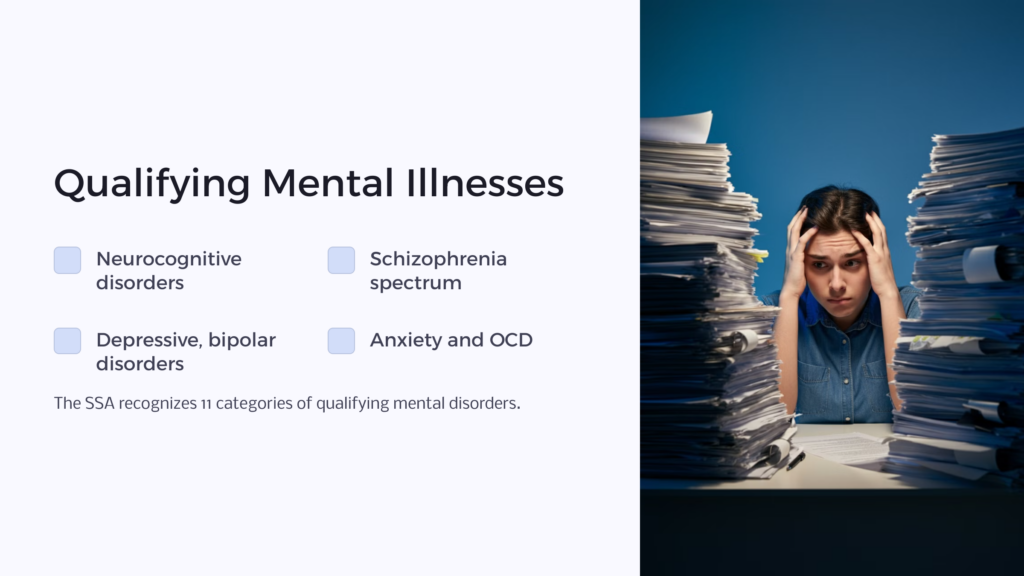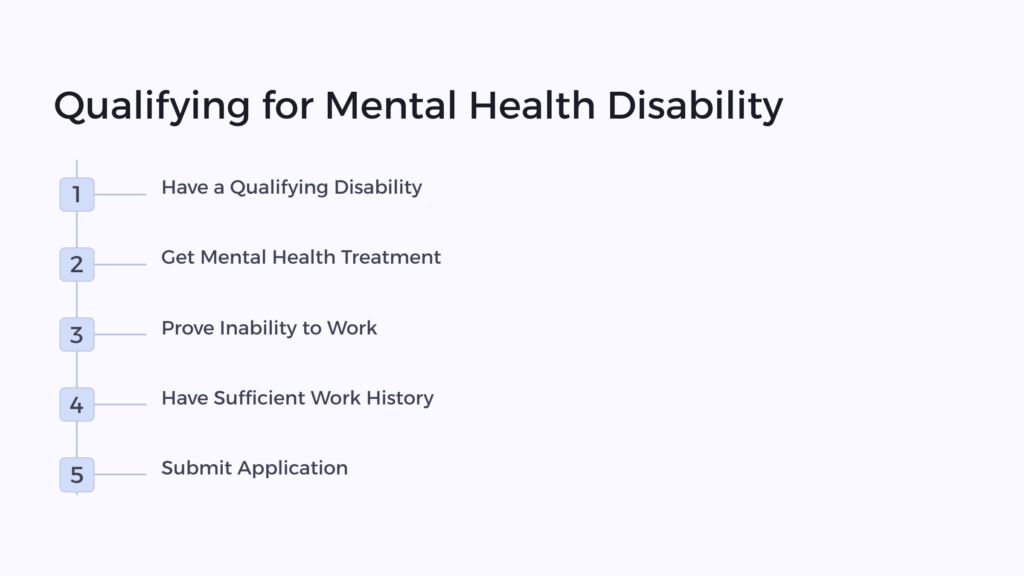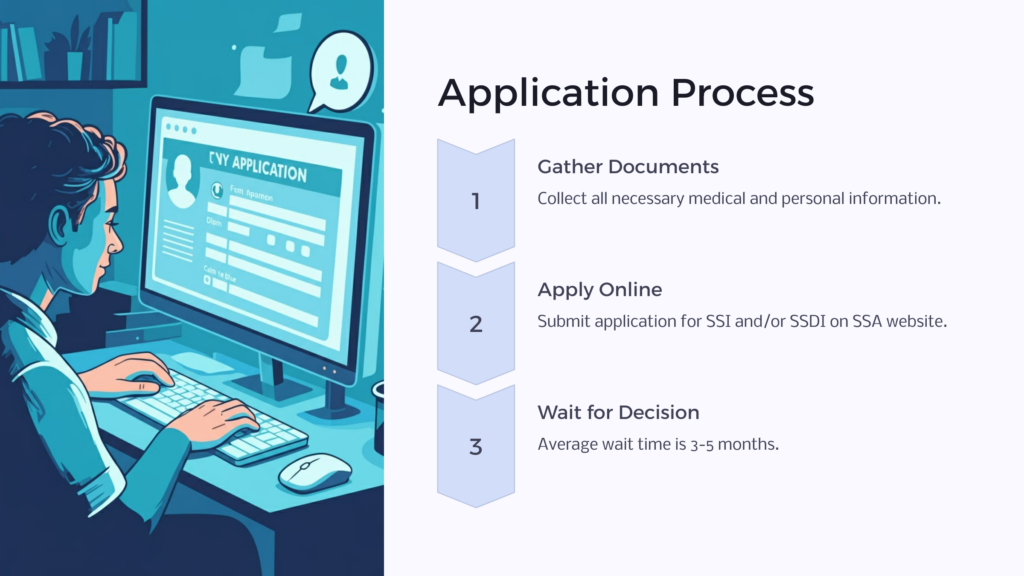If you suffer from a debilitating mental illness, you may qualify for disability benefits. But before you apply, it’s important to know the Social Security Administration’s eligibility requirements.
So, is it hard to get disability for mental illness? While it may seem like a complex process, the government has provided clear guidelines to determine whether you should receive benefits.
Ahead, we’ll cover qualifying mental illnesses and eligibility requirements and share five tips to help you get approved.
What Mental Illnesses Qualify for Disability?

- Neurocognitive disorders
- Schizophrenia spectrum and other psychotic disorders
- Depressive, bipolar, and related disorders
- Intellectual disorder
- Anxiety and obsessive-compulsive disorders
- Somatic symptom and related disorders
- Personality and impulse-control disorders
- Autism spectrum disorder
- Neurodevelopmental disorders
- Eating disorders
- Trauma- and stressor-related disorders
The SSA website also lists some of the common disorders included in each of these categories, along with definitions and related symptoms.
Is It Hard To Get Disability for Mental Illness?
Getting disability for a mental disorder can be tricky, as the subjective nature of mental illness makes it harder to evaluate and document than physical illnesses. To get approved, it’s critical to understand how the SSA evaluates mental disabilities.
To receive benefits, you’ll need to provide the SSA with thorough documentation of your disorder and treatment history. Unfortunately, the stigma surrounding mental health treatment may prevent some people from ever seeking it. If you’ve yet to see a mental health care professional about your condition, you’ll want to do so before you start the application process.
If you’re concerned about having your application rejected, know that you can request a disability appeal using the SSA’s online portal. It’s important to note that you may have to provide further documentation related to your mental illness as part of this process.
How Do You Qualify for Mental Health Disability?

In order to qualify for disability with a mental illness, you’ll have to adhere to the Social Security Administration’s guidelines. Let’s break down the five key steps to follow when submitting an application.
1. Have a Qualifying Disability
Before you begin the application process, check the SSA Blue Book to ensure that your mental health condition falls under one of the 11 qualifying categories. As an example, if you suffer from major depressive disorder, you’ll find it referenced in category three: Depressive, bipolar, and related disorders.
Per SSA guidelines, disabilities must last at least 12 months to qualify, so you can’t get benefits for short-term mental health issues. You’ll also want to consider whether substance abuse contributes to your mental disorder, as this may affect how the SSA determines your disability. If medical evidence shows that your condition only occurs due to drug or alcohol abuse, your application will likely be denied.
2. Get Mental Health Treatment for Your Condition
In order to qualify for benefits, you must seek medical treatment for your disorder before submitting an application to the SSA. Treatment can include therapy, psychiatry, and doctor or hospital visits resulting from your illness.
The SSA favors evidence from acceptable medical sources, like licensed therapists, psychiatrists, counselors, or doctors.
Forms of suitable evidence include:
- Records from medical professionals who have treated you for mental illness
- Hospitalization records if you were hospitalized due to your disorder
- Pharmacy records for mental health-related prescriptions
- Results of laboratory and other tests (if applicable)
Some form of medical evidence is required to prove both the existence and severity of your mental illness. The evidence must also show that you’ve complied with any prescribed medical treatments. Without documentation of medical treatment, the SSA is unlikely to accept your application.
3. Prove You Cannot Work Due to Your Mental Illness
To qualify for disability with a mental illness, you must be able to prove that your symptoms prevent you from working. This means you’ll have to provide evidence that your disorder seriously impairs your ability to function in a work setting.
This step goes hand in hand with the medical evidence discussed in step two. The SSA requires documentation — preferably from a medical professional — that proves you are unable to hold a job because of mental health issues.
Your work history may show you’ve been unemployed, but that alone won’t cut it. If you aren’t working due to the severity of your mental illness, you’ll need medical evidence to prove it. Extensive documentation from a therapist, psychiatrist, or psychologist will be your best bet.
4. Have Sufficient Work History
In addition to proving that you cannot work due to mental illness, be ready to supply the SSA with your work history.
This is only important if you plan to apply for Social Security Disability Insurance (SSDI), as eligibility for this program is based on work history. Because SSDI provides income to those who cannot work due to their disability, being gainfully employed will reduce your chances of being accepted even if you have a qualifying mental illness.
If you are able to work but still require benefits, consider applying for Supplemental Security Income (SSI) instead. SSI is a needs-based program that does not require work history. Both programs are open to applicants with qualifying mental disorders.
5. Submit an Application
When you’re ready, you can apply for SSI and/or SSDI on the SSA website. Remember, sufficient work history is required for SSDI and will determine your eligibility.
If you’re applying for SSDI, the SSA has provided a checklist of everything you’ll need to file online. Note that you can be approved for both SSDI and SSI, depending on your eligibility.
When filing for SSI, you’ll be asked to supply the following information:
- Your Social Security number
- A birth certificate or other proof of age (driver’s license, passport, etc.)
- Proof of U.S. citizenship or SSI-eligible non-citizen status
- Residence information (address, phone number, or other proof of residency)
- Information about resources and assets (real estate, stocks, etc.)
- If disabled, contact information for medical treatment providers
Once you’ve submitted your application, the SSA will contact you with a decision. You can expect to wait an average of three to five months, but it may take longer if there are issues with your application or documents.

Frequently Asked Questions
Still wondering how to get disability benefits for mental illness? We’ve got you covered with quick answers to common questions.
Can You Get Disability for Mental Illness?
Yes, it is possible to get disability for mental illness. Qualifying mental disorders can be found in the SSA Blue Book, along with the requirements to prove your illness is truly disabling.
What Is Proof of Mental Disability?
For Social Security purposes, proof of mental disability comes in several forms, including medical records, mental health status evaluations, and evidence that your illness makes it impossible to work.
How Long Does It Take To Get Disability for Mental Illness?
Typically, you’ll hear back from the SSA with a decision in three to five months, though this process may take longer if they need to access or request medical records and other evidence.
Benefits.com Can Help You Find Benefits You Qualify For
While it can be hard to get disability for mental illness, you should apply if you qualify based on the SSA’s guidelines. At Benefits.com, we’re committed to helping you understand Social Security so you can get the right benefits based on your eligibility. To learn more, take our Benefits Quiz and find a plan that works for you.
 Benefits.com Advisors
Benefits.com Advisors
With expertise spanning local, state, and federal benefit programs, our team is dedicated to guiding individuals towards the perfect program tailored to their unique circumstances.
Rise to the top with Peak Benefits!
Join our Peak Benefits Newsletter for the latest news, resources, and offers on all things government benefits.



















